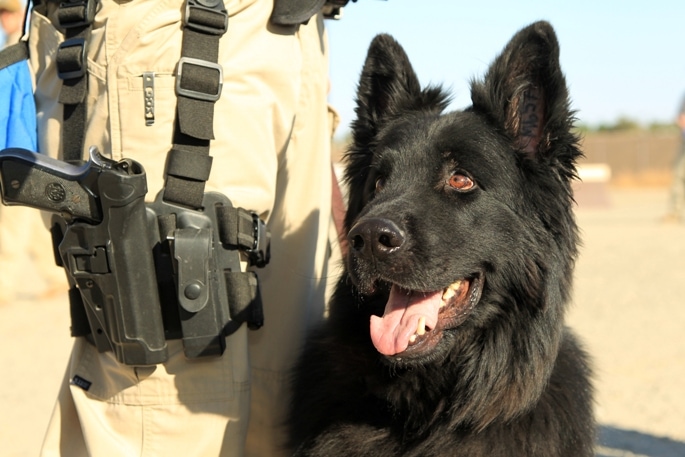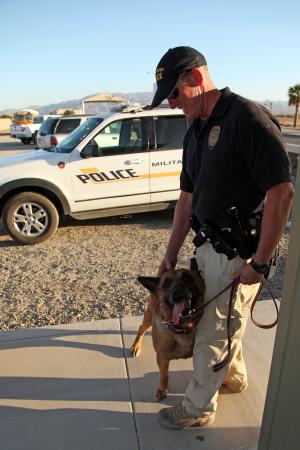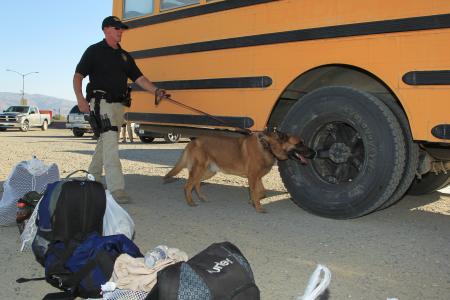
TWENTYNINE PALMS, Calif. – When Myke Erdmann first put in his application to join the Provost Marshal’s Office as a dog handler, he wasn’t sure he even liked dogs. Now, after more than a year working with his K9 partner Rex, he shares a strong enough bond with his dog that he has eventual adoption in mind.
There are 12 military working dogs stationed at the Combat Center, and 11 handlers who see to their well-being and training. These dogs sniff out everything from people to explosives to narcotics, and together with their handlers, add a little something extra to the installation’s police force that wouldn’t be possible without them.
“Their detection is outstanding,” said Erdmann, who spent 15 years in the Marine Corps and five years as a soldier afterward. “They are good with crowd control, too, because they are a deterrent. When you see a dog barking with his teeth barred, you’re going to think twice.”

These dogs are hand selected and undergo intensive training. Even after they graduate from the K9 version of basic training, they still have continuous hours of detection, obedience and aggression training required every week. Their handlers work with them Monday through Friday to make sure their skills stay sharp. “They have training requirements, just like Marines,” Erdmann said.
When they aren’t training or resting, the dogs are out with their partners patrolling, on the look-out for any situation where their superior noses come in handy. One of their routine duties is at the gate inspecting vehicles bringing new role players for Enhanced Mojave Viper cycles and their luggage for contraband while the military police are busy physically patting down visitors. Rarely does the group ever find anything of note, though.
“We usually don’t find anything, but better to be safe,” said PMO dog handler Joshua Billig, who is partnered with a dog named Dennis. “It’s that one time when you don’t check.”
The dogs’ duties are not restricted to the Combat Center. Erdmann and Rex have deployed together four time to various parts of the country to augment security for the President of the United States and other dignitaries.
“You get close, spending a week and a half in a hotel together,” Erdmann said. “They put his kennel right in the room with me.”
Each dog is paired with their human counterparts based on personalities and ability. One afternoon around several teams, and the thought that goes into the teams is obvious.
Rex has deployed six times and is 10 years old. He has a gruffer edge to him, and less patience. Erdmann, being a veteran of several deployments himself, understands how Rex feels.
Dennis is more laidback and playful than Rex, and is perfectly suited with his handler, Billig, who is younger than Erdmann. Dennis has never deployed to a combat zone and Billig has never worn a military uniform.
However well matched these two pairs may be, the handlers go into the job knowing the dogs are considered military equipment while on the force, and that’s something they all have to accept.
“When you start this job, you know they’re government property,” Erdmann said. “I got close to him [Rex]. But you take this job realizing you can have a new dog tomorrow.”
The uncertainty of a partnership is balanced by the knowledge that there is a chance to one day turn the working relationship into a permanent family tie. Handlers have first dibs on ownership when a dog is ready to retire.

“He’s like family now; he’s a part of me,” Erdmann said. “When he retires, either me or another handler is adopting him. I just have to get a fence put up around my house.”
Rex is slated for retirement soon, and Erdmann has already started training Rex’s replacement. As soon as the new dog is ready to take on full duties, Rex will reap the benefits of his years of service and live out the rest of his life as a private citizen.
Billig also expressed a strong determination to adopt Dennis when it is his time to leave the force as well.
But, for now, the four, along with the rest of the military working dog crew, focuses on the task at hand – to protect the Combat Center community.
“Our sole purpose in life is to make things safe,” Erdmann said.
